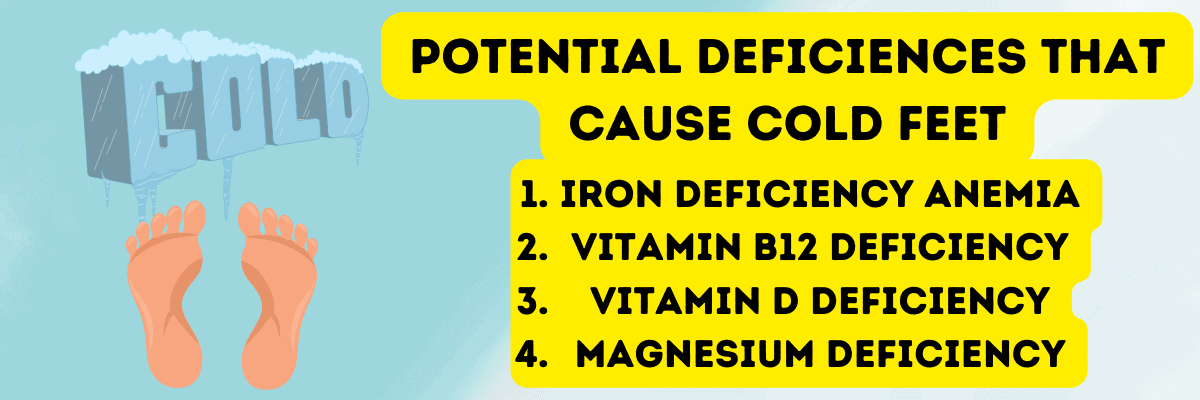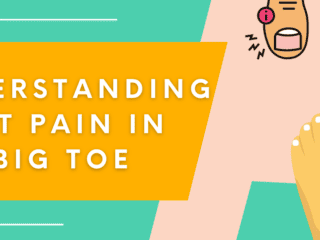Feeling a little unusually cold when others feel warm and toasty? Or if you feel chilly even if it’s scorching hot outside? There might be a health issue at play that you may not notice, like a lack of particular vitamins and minerals.
This article will discuss what vitamin deficiency causes you to feel cold and how to overcome them.
- What Vitamin Deficiency Causes You To Feel Cold?
- Factors That Cause Sudden Feelings Of Coldness
- Vitamin & Mineral Deficiencies That May Decrease Body Temperatures
- Vitamin D Deficiency – Does It Really Make You Feel Cold?
- What Deficiency Causes Cold Feet?
- Symptoms of Vitamin Deficiencies
- Causes of Vitamin Deficiencies
- Diagnosis and Treatment
- Conclusion
- Related Posts
What Vitamin Deficiency Causes You To Feel Cold?
Factors That Cause Sudden Feelings Of Coldness
Numerous factors could lead to a sudden decrease in body temperatures, such as:
- Lack of sleep – One study found that sleep deprivation may disrupt the body’s ability to regulate body temperature and make you feel cold or chilly throughout.
- Thyroid problems – In hyperthyroidism, the body produces excess thyroid hormone and increases body temperature. However, with hypothyroidism, the body temperature decreases because of the lack of the said hormone.
- Heart problems – When one suffers from heart problems like chronic heart failure, the cardiovascular system changes affect thermoregulation.
- Those with heart failure experience coldness in the extremities (arms, hands, feet, and legs) as a result of the body circulating most of the available blood to all the vital organs to compensate for the heart’s inability to pump enough blood to the entire body.
- Low-calorie diet – Feeling cold while on a low-calorie diet results from your body not having sufficient energy to fuel metabolism and regulate its own temperature, which may be due in part to lower levels of T3 thyroid hormone.
- Extremely low body fat – A lack of body fat means you don’t have that much insulation to keep you warm. Eating less to maintain that low body fat percentage slows down your metabolism and may keep you less warm.
- Low muscle mass – New York-based internist Dr. Margarita Rohr says that having a low body weight also means having low muscle mass, which could also be a contributing factor to frequent chilliness.
- Cancer treatments (chemotherapy) – Cancer patients may experience a temporary but intense sensitivity to cold due to the side effects of chemotherapy. The sensitivity may last several days or even weeks but is only temporary.
- Stroke – One study done on 1322 stroke patients found that those who had a severe stroke had relatively low body temperatures within 12 hours of symptoms, only to rise 4 to 6 hours after stroke onset.
Vitamin & Mineral Deficiencies That May Decrease Body Temperatures
Aside from health factors, some people can also feel chilly from low levels of certain vitamins and nutrients.
Vitamin B12 Deficiency
The primary benefit of Vitamin B-12 (cobalamin) is promoting red blood cell formation, cell metabolism, nerve function, and the production of DNA, the molecules inside cells that carry genetic information. The red blood cells carry oxygen to all parts of your body.
Without enough B12, you might not have enough healthy red blood cells to move oxygen around your body (anemia). That can leave you shivering and cold, especially in your hands and feet – in some cases, it may lead to hypoxemia, where aside from your skin getting cold and clammy, you might experience sweating or wheezing or your skin turning blue.
Iron Deficiency Anemia
Anemia is a result of iron deficiency. A lack of iron in the body can’t produce enough of a substance in red blood cells called hemoglobin that enables them to carry oxygen, which may leave you feeling fatigued and short of breath.
Since people with anemia have poor blood circulation in their bodies because they don’t have enough red blood cells to provide oxygen to their tissue, it’s common to feel cold in the extremities, like the hands and feet.
Folate Deficiency Anemia
People with iron deficiency usually have too little folate in their blood. Folic acid is a B vitamin that helps your body make red blood cells, and having a deficiency in folic acid causes a decrease in RBCs, resulting in folate deficiency anemia. This explains why iron and folate deficiencies often occur at the same time.
As iron and folate work together to promote the production of red blood cells, having a lack of both minerals can cause a drop in body temperatures, particularly in the extremities.
Magnesium Deficiency
Magnesium is an important mineral that helps with body temperature regulation and is responsible for more than 300 biochemical reactions in the body. It prevents blood vessels from contracting, increases blood pressure, and improves blood flow.
A magnesium deficiency can result in muscle stress, causing the diameter of the arteries to reduce in size, which leads to decreased blood flow, resulting in cold hands and feet.
Potassium Deficiency
Potassium is found naturally in many foods and as a supplement. Its main role in the body is to help maintain normal levels of fluid inside our cells. It also helps muscles to contract and supports normal blood pressure by relaxing the blood vessels so that blood flows through them more easily, with less pressure.
Vitamin D Deficiency – Does It Really Make You Feel Cold?
Vitamin D is a fat-soluble vitamin known to help the body absorb and retain calcium and phosphorus; both are critical for building bone. It strengthens the immune system, prevents certain types of cancer, lowers the risk of type 2 diabetes, lowers blood pressure, and reduces the risk of heart disease.
Vitamin D deficiency is associated with increased autoimmunity and increased susceptibility to infection. In this case, vitamin D deficiency per se doesn’t result in bodily chills, but it does make you prone to the common cold, as studies show that vitamin D influences the risk of getting colds and other respiratory infections.
However, other studies also show that vitamin D is associated with oxygen utilization and cardiorespiratory fitness in healthy adults, which may indirectly influence cold sensations in the body.
What Deficiency Causes Cold Feet?

Cold feet can have many potential causes, and a nutrient deficiency is just one possibility among them. Here are some possible nutrient deficiencies that could contribute to cold feet:
- Iron deficiency anemia: Iron is needed to produce hemoglobin, which carries oxygen throughout the body. Without enough iron, the body can’t make enough hemoglobin, which can lead to anemia. Anemia can cause cold feet (and hands) because the body is not able to deliver enough oxygen to these extremities.
- Vitamin B12 deficiency: Vitamin B12 is necessary for proper nerve function, and a deficiency can cause nerve damage or dysfunction. This can lead to sensations of coldness or numbness in the feet.
- Vitamin D deficiency: Vitamin D is important for bone health and immune function. A deficiency can cause a variety of symptoms, including muscle weakness and fatigue, which could contribute to feeling cold all over.
- Magnesium deficiency: Magnesium is an important mineral that plays a role in many bodily functions, including muscle and nerve function, and blood sugar regulation. A deficiency can cause a range of symptoms, including muscle cramps and weakness, which could contribute to cold feet.
It’s worth noting that many other factors can also contribute to cold feet, including poor circulation, nerve damage, hypothyroidism, and Raynaud’s disease. If you’re experiencing cold feet, it’s a good idea to talk to your doctor to determine the underlying cause and appropriate treatment.
Symptoms of Vitamin Deficiencies
Vitamin deficiencies manifest themselves in the following symptoms:
- Fatigue & weakness – Deficiencies in certain nutrients such as iron and vitamins B12 and D may cause fatigue, diminished energy, and exercise tolerance
- Pale skin – Folic acid, or vitamin B-9, helps the body produce red blood cells, and a lack of folate in your diet can also lead to a loss of skin pigmentation, resulting in pale or sometimes yellowish skin.
- Numbness or tingling in the hands and feet – Not having enough vitamin B12 can result in strange sensations, numbness, or tingling in the hands, legs, or feet due to the poor blood flow in the extremities.
- Shortness of breath – Anemia that results from vitamin B-12 deficiency may cause a person to feel breathing problems or dizziness.
- Irregular heartbeats – A lack of calcium, magnesium, and vitamin D can cause an irregular heartbeat. Vitamin D levels affect the amount of calcium the body absorbs, which in turn, generates electronic impulses and muscle contractions that regulate heartbeats.
- Irregular periods – One study found that low vitamin D levels could be linked to irregular periods. A lack of B-complex vitamins could also impact thyroid hormone production.
- Weight loss – Unintentional or rapid weight loss can stem from long-standing nutritional deficiencies or inadequate diets.
- Cognitive problems – Not having enough vitamin B12 may impact one’s cognitive abilities, particularly processing speed, mental shifting, and information updating.
- Mental health problems – Vitamin B deficiency (B1, B6, B7, B12, B complex) can cause a disruption in the nervous and circulatory system and trigger mental health problems like depression, anxiety, and mood swings.
Causes of Vitamin Deficiencies
Vitamin deficiencies stem from various health factors and even lifestyle habits like:
Inadequate dietary intake
Vitamins are complex molecules in fruit, vegetables, grains, meat, poultry, and seafood. Each vitamin is found in more than one type of food, and some foods are fortified with vitamins.
However, certain diets, healthy they may be, can make you prone to vitamin deficiency. Those who follow a vegan or vegetarian diet can be at risk of protein, vitamin B12, and biotin deficiency, given that vitamin B12 is found in meats. Those who are dairy-free could be at risk of vitamin D deficiency and other nutrients like calcium, riboflavin, and phosphorus.
A gluten-free diet can make you deficient in many vitamins, including folate, thiamine, iron, magnesium, calcium, and zinc, naturally found in grains. Those who eat too many processed foods and not enough fresh fruits and vegetables can lack vitamins E and K.
Nutrient malabsorption
Sometimes, you may eat enough healthy foods and still be unhealthy – this is because of malabsorption, which is the small intestine’s inability to absorb nutrients and can lead to indigestion and even malnutrition.
Health problems, like those related to the small intestine, may hinder the body from absorbing important nutrients.
Chronic illnesses
insufficient vitamin intake is apparently a cause of chronic diseases and vice versa. Experts say that vitamin deficiencies could also be critical risk factors for chronic diseases such as cardiovascular disease, cancer, and osteoporosis.
On the other hand, kidney, liver, and digestive diseases can also hinder nutrient absorption, leaving patients vulnerable to other conditions and health risks.
Diagnosis and Treatment
Sometimes, certain symptoms don’t always signify a specific vitamin deficiency, so diagnostic testing is the only way to confirm a vitamin deficiency. Ask your healthcare provider to guide you through testing options.
Blood tests
Blood tests can confirm the signs of vitamin deficiency and determine your vitamin levels. A complete blood count is the most common screening test.
Dietary changes
Long-term dietary changes can help correct and prevent nutrient deficiencies. You can ask a dietitian or a doctor to guide you through which foods contain the vitamins you need or ask for a specific meal plan.
Vitamin and mineral supplements
Taking nutritional/dietary supplements is also a good way to help fill in nutritional gaps. Your doctor may prescribe an over-the-counter (OTC) or a prescription supplement.
Conclusion
Vitamin deficiencies can be detrimental to one’s overall health and well-being, causing health problems like fatigue, weight loss, and coldness in the extremities. Recognizing the causes and treating these vitamin deficiencies early on helps you overcome them, allowing you to enjoy a better quality of life.
Consult your doctor if you experience any health problems mentioned above to help you determine a deficiency early on and walk you through the proper treatment options.
Disclaimer: this article does not constitute or replace medical advice. If you have an emergency or a serious medical question, please contact a medical professional or call 911 immediately. To see our full medical disclaimer, visit our Terms of Use page.
Related Posts
What Vitamin Deficiency Causes You To Crave Salt?
What Vitamin Deficiency Causes Stomach Bloating?








